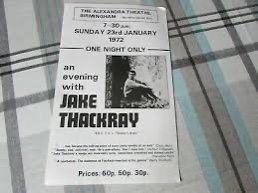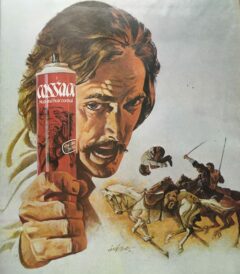A household name in the 60s and 70s, Jake Thackray’s bawdy lyrical brilliance deserves to be resurrected
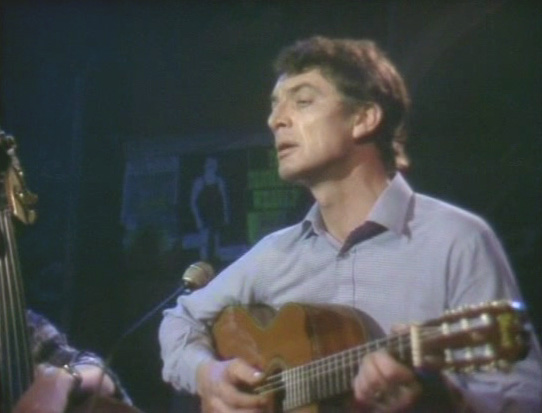
While watching yet another episode of that surreal 60s and 70s experience Sunday Night at the London Palladium (See Tarbuck Memories: Sunday Night at the London Palladium below) last week from 1974 on the wonderful Talking Pictures TV, compere Jim Dale sat at the front of the stage and sang a ballad entitled Lah-Di- Dah. He explained it was a song about a young man being taken by his girlfriend to spend a day at the home of her awful family. Dale didn’t say who wrote and originally performed the song but within a few bars I instinctively knew it was a Jake Thackray song. The gloomy ballad gives no indication that there is any humour in the song unless you were really listening to the lyrics but the structure and rhythm was unmistakably Thackray. Whenever the line ‘..and I’ll bill and coo with your gruesome Auntie Susan.. is delivered, you know this isn’t a straightforward love song. The line about her dad ‘ ..and I’ll have to grit my teeth when he goes on about his rup-ture….‘ puts the tin hat on it. This is classic Thackray, all delivered in a wonderfully lugubrious deadpan. The SNATLP audience seemed to pay attention politely but never was a titter heard. Poor Jim must have known he was casting pearls before swine, but good on him for trying to do something that didn’t require sequins and high-kicking Tiller Girls.
Few people in the audience watching this bizarre festival of ‘variety’ schlock would have recognised a Jake Thackray song if they’d met it in their soup, but for nearly 20 years throughout the 60s and 70s Thackray was a regular performer on a range of TV variety shows. His first appearance was on ITV’s The Braden Beat, latterly Braden’s Week after it transferred to the BBC. A comedy and consumer affairs vehicle for Canadian Bernard Braden, as well as Thackray the show also featured Peter Cook and the recently sadly departed Tim Brooke Taylor. After the show was cancelled in 1972 due to Braden spreading himself too thinly and advertising margarine on ITV, which was tabloid headline news, Thackray continued to add a bit of class to the successor to Braden’s Week, the shockingly downmarket That’s Life.
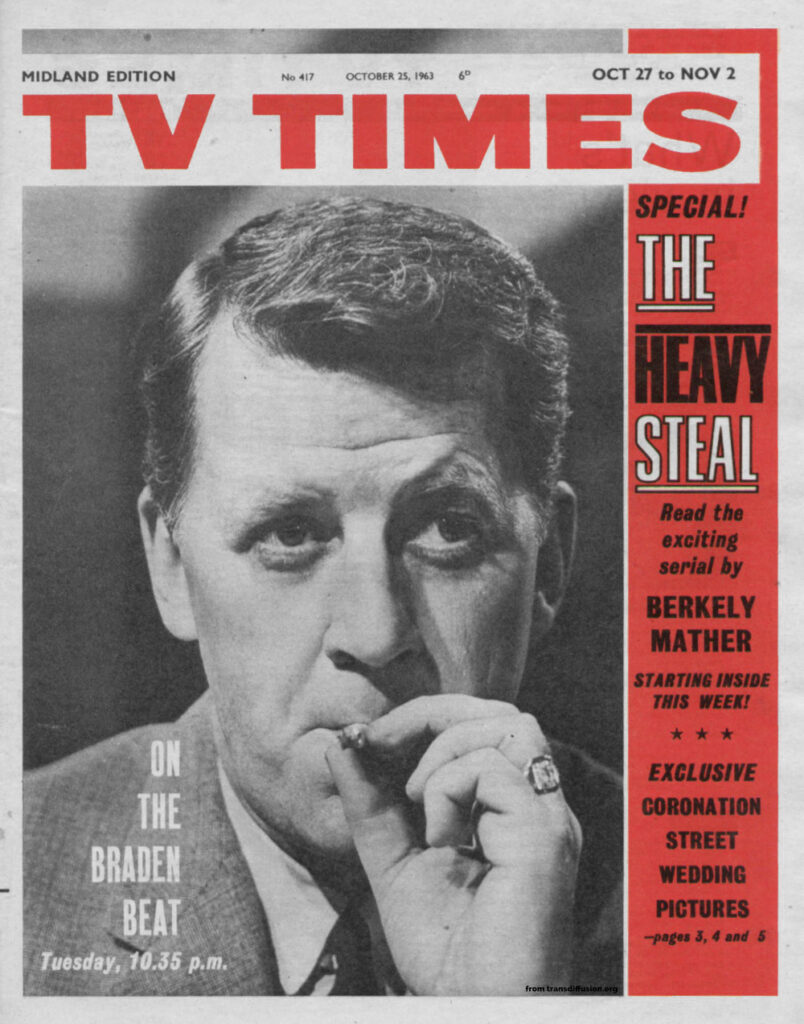
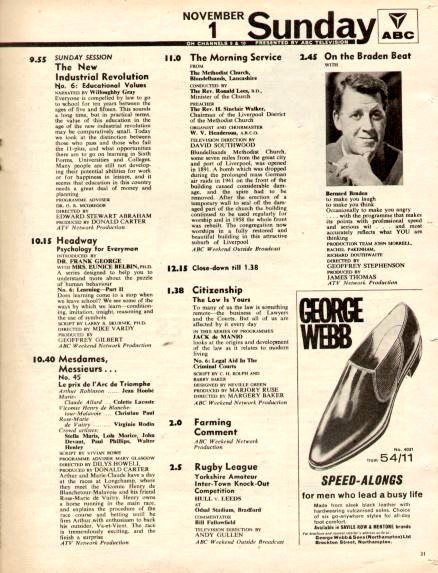
I remember clearly watching him on various shows during the 60s and 70s and finding him quite intimidating. Was he meant to be funny? His lyrical mastery was still beyond me as a juvenile, but I knew there was something about him that was different. His lugubrious manner, clipped diction, deadpan delivery and was he really saying what I think he was saying? And that was an important element of his genius, the inspired and unexpected vocabulary, the hilarious grotesqueness of his subject matter, the laugh-out-loud one-liners, the preposterous characters, not forgetting the whimsical beauty of many of his ballads. There were other artists who wrote humorous songs but they laughed along with the audience (Lance Percival anyone?), ruining the effect. Thackray left the audience to make its own mind up and often he was just too quick and clever for it. In fact, after his first appearance on Braden’s Beat the TV company was deluged with complaints but slowly he won people round.
He also contributed regularly to The David Frost Show and even Frost Over America. I wonder what the Yanks made of his songs about cross- dressing nuns, his roly-poly girlfriend and suburban female devil-worshippers?
Coming from a fairly authoritarian home background in Leeds his dad, Ernest Thackray (what a wonderful Thackrayan name!) was a village policeman. Sent to a Jesuit college in Wales, Jake Thackray went on to study Modern Languages at Durham University and moved to France for a number of years to teach. It was here he was introduced to the chansonniere musical tradition, particularly that of Georges Brassens and Jacques Brel, which influenced his music for the rest of his life. His lyrical style was even thought reminiscent of Noel Coward, something which Thackray reportedly hated. But his Yorkshire roots link him more, I believe, to that of Alan Bennett, another Leeds native, and Bennett’s deadpan humour can be heard regularly in his songs. Or maybe it was the other way round….
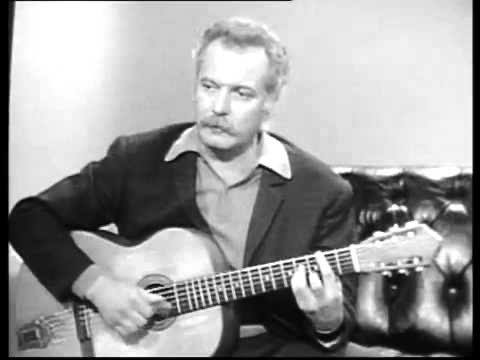
His bitter-sweet stories can also be traced to later northern songwriters such as Morrissey and Jarvis Cocker whose subject matter was very similar. The Smiths’ Girlfriend In A Coma or Pulp’s Babies are songs that seem very much influenced by Jake Thackray. The Morrissey line, ‘..I still love you.. only slightly, slightly less than I used to..’ from Stop Me If You’ve Heard This One Before is pure Thackray. During the 80s he was accused by some of misogyny with regards to some of his lyrics about women. It’s fair to say that a song which begins ‘I love a good bum on a woman, it makes my day..’ (On Again, On Again) does suggest a negative stereotype but that has to be set against other writers and comedians of the time. To witness Jimmy Tarbuck or Ted Rogers‘ routine on SNATLP would certainly be watching something misogynystic, so to criticise Jake Thackray is not seeing the wood for the trees. But for most of his songs he was singing in character, although maybe much of the subject matter was of the type that interested Jake Thackray. But bollocks to that, he was clever, funny, unpredictable, fascinating and unique and he was no Harvey Weinstein, and it was the 60s and 70s, that’s really all that mattered.
But balance that against his song The Hair of the Widow of Bridlington, about a widowed woman who takes control of her life again, and the accusation of misogyny is just plain wrong.
She found that she could please herself
She could, could the widow of Brid
Swim in the sea when she felt hot
Stay in bed when she did not
And she began to laugh a lot
She did, she did, she did
To sing and dance and laugh a lot
She did, did the widow of Brid
The Hair of the Widow of Bridlington
The excellent Ian McMillan, poet and broadcaster also from Yorkshire, even wrote a stage show about Thackray entitled ‘Sister Josephine Kicks The Habit‘ referencing one of Thackray’s most celebrated and typically strange songs, ‘Sister Josephine,’ about a nun in a convent who appears to be a male burglar on the run from the police, although this doesn’t seem to bother the other nuns.
No longer will her snores ring through the chapel during prayers
Nor her lustful moanings fill the stilly night
No more empty bottles of altar wine come clunking from her cell
No longer will the cloister toilet seat stand upright
‘Sister Josephine’
Or even the bizarre nature of The Castleford Ladies’ Magic Circle about a group of middle-aged, middle-class ladies who meet up every week to practise devil-worship. A scenario only a crazed but brilliant mind could come up with.
Their husbands potter at snooker down the club
Unaware of the devilish jiggery-poke and rub-a-dub-dub
While Elizabeth Jones and Lily O’Grady
And three or four more married ladies
Are frantically dancing naked for Beelzebub
The Castleford Ladies’ Magic Circle
After all this they go dutifully home to their boring husbands in time for ‘cocoa and The Epilogue.‘ If this isn’t a song about women taking their lives by the scruff of the neck and doing something that pleases them, irrespective of how bizarre, then I don’t know what is. And did the Pythons get their idea for The Batley Townswomen’s Guild’s interpretation of The Battle of Pearl Harbour, amongst other re-enactments, from this song?
And as for Isabel Makes Love Upon National Monuments, it sums up just how irreverent, iconoclastic and downright funny he could be.
Many a monolith has seen Isabel
Her bright hair in turmoil, her breasts’ surging swell
But unhappy Albert, so far denied
The bright sight of Isabel getting into her stride
After his tragically early death in 2002 at the age of 64 the musician Momus described Thackray as ‘..surprisingly sexy, sexist, smutty, saucy in such a sixties way.’ Where does one end and the other begin? It was the way it was then and we know better now, but we’re also capable of putting it into context, and it does not diminish his brilliance one iota. The same could be said for Benny Hill, criminally ignored nowadays as if he was a sex offender. His lyrical virtuosity was on a par with Thackray’s although maybe heavier on the ‘sauciness‘. Not neccessarily a bad thing.
She nearly swooned at his macaroon
And he said if you treat me right
You’ll have hot rolls in the morning
And crumpet every night
Ernie: The Fastest Milkman in the West
Thackray died far too young of kidney failure in 2002 aged 64 and his latter years were not kind to him, but one of his earliest songs ‘The Last Will and Testament of Jake Thackray’ let his public know that mourning was not his bag.
I, the undermentioned, by this document
Do declare my true intentions, my last will, my testament
When I turn up my toes, when I rattle my clack, when I agonise
I want no great wet weepings, no tearing of hair, no wringing of hands, no sighs
No lack-a-days, no woe-is-me’s and none of your sad adieus
Go, go, go and get the priest and then go get the booze, boys
His early death was extremely sad but he left a raft of brilliantly funny, clever, unique and often lyrically beautiful songs that never fail to raise a smile.
Exactly what he would have wanted.
